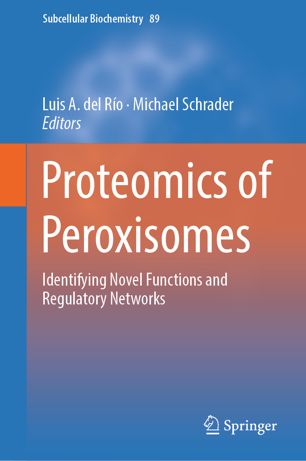

Most ebook files are in PDF format, so you can easily read them using various software such as Foxit Reader or directly on the Google Chrome browser.
Some ebook files are released by publishers in other formats such as .awz, .mobi, .epub, .fb2, etc. You may need to install specific software to read these formats on mobile/PC, such as Calibre.
Please read the tutorial at this link: https://ebookbell.com/faq
We offer FREE conversion to the popular formats you request; however, this may take some time. Therefore, right after payment, please email us, and we will try to provide the service as quickly as possible.
For some exceptional file formats or broken links (if any), please refrain from opening any disputes. Instead, email us first, and we will try to assist within a maximum of 6 hours.
EbookBell Team

4.1
80 reviewsThis new edited volume in the Springer Subcellular Biochemistry Series presents a comprehensive, state-of-the-art overview of the proteomics of peroxisomes derived from mammalian, Drosophila, fungal, and plant origin, and contains contributions from leading experts in the field.
The development of sensitive proteomics and mass spectrometry technologies, combined with bioinformatics approaches now allow the identification of low-abundance and transient peroxisomal proteins and permits to identify the complete proteome of peroxisomes, with the consequent increase of our knowledge of the metabolic and regulatory networks of these important cellular organelles. The book lines-up with these developments and is organized in four sections including: (i) mass spectrometry-based organelle proteomics; (ii) prediction of peroxisomal proteomes; (iii) analysis of peroxisome proteome interaction networks; and (iv) peroxisomes in relation to other subcellular compartments.
The editor Luis A. del Río is Professor ad honorem of the Spanish National Research Council (CSIC) in the Group of Antioxidants, Free Radicals and Nitric Oxide in Biotechnology, Food and Agriculture, Department of Biochemistry and Cell & Molecular Biology of Plants, at the Estación Experimental del Zaidín, Granada, Spain. Del Río’s research group focuses on the metabolism of reactive oxygen species (ROS), reactive nitrogen species (RNS) and antioxidants in plant peroxisomes, and the ROS- and RNS-dependent role of peroxisomes in plant cell signalling.
The editor Michael Schrader is Professor of Cell Biology & Cytopathology in the Department of Biosciences at the University of Exeter, UK. Using mammalian peroxisomes as model organelles, Prof. Schrader and his team aim to unravel the molecular machinery and signalling pathways that mediate and regulate the formation, dynamics and abundance of these medically relevant cellular compartments.